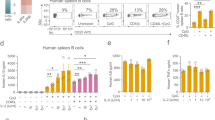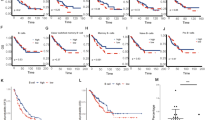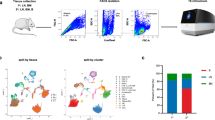Abstract
Interleukin B (IL-B) (ref. 1), formerly termed BEF (B-cell-derived enhancing factor)2,3 or IL-B4 (ref. 4), was originally described as a non-immunoglobulin regulatory factor spontaneously produced by B lymphocytes and B-cell lines that enhances the in vitro antigen-driven antibody response of unfractionated spleen cells stimulated by thymus-dependent antigens2,3. Since then we have examined the function of interleukin B in a number of immune reactions, both in vitro and in vivo5, and found that it inhibits the activation of suppressor T lymphocytes3,6–9. We report here the production of two monoclonal antibodies (mAb) that specifically inhibit interleukin B activity. The use of these mAb in the purification and characterization of IL-B is described. IL-B from both normal and transformed B cells consists of two subunits of similar size and amino-acid composition. The structure of interleukin B and its specific behaviour in biological assay distinguish it from many other known lymphokines.
This is a preview of subscription content, access via your institution
Access options
Subscribe to this journal
Receive 51 print issues and online access
$199.00 per year
only $3.90 per issue
Buy this article
- Purchase on Springer Link
- Instant access to full article PDF
Prices may be subject to local taxes which are calculated during checkout
Similar content being viewed by others
References
del Guercio, P., Marcelletti, J. F. & Katz, D. H. Immun. Today 7, 97–98 (1986).
del Guercio, P., Poirier, M.-F. & Brugere, S. Cell Immun. 72, 316–325 (1982).
del Guercio, P., Brugere, S. & Poirier, M.-F. Cell Immun. 73, 360–364 (1982).
del Guercio, P., Marcelletti, J. F., Zuberi, R. I., del Guercio, M.-F. & Katz, D. H. J. cell Biochem. Suppl. 10A, 84 (1986).
del Guercio, P. & Katz, D. H. CRC Crit. Rev. Immun. 6, 185–212 (1986).
del Guercio, P. & Poirier, M.-F. J. Immun. 131, 1283–1288 (1983).
del Guercio, P., Fridman, W. H., del Guercio, M.-F. & Katz, D. H. in Advances in Gene Technology: Molecular Biology of the Immune System (eds Streilen, J. W. et al.) 175–176 (Cambridge University Press, 1985).
del Guercio, P., del Guercio, M.-F., Fridman, W. H. & Katz, D. H. J. Immun. 138, 3295–3299 (1987).
del Guercio, P., Zanetti, M., del Guercio, M.-F. & Katz, D. H. J. Immun. 134, 3926–3933 (1985).
Kearney, J. F., Radbruch, A., Liesegang, B. & Rajewsky, K. J. Immun. 123, 1548–1550 (1979).
Bazin, H. in Protides of the Biological Fluids (ed. Peeters, H.) 615–618 (Pergamon, New York, 1982).
del Guercio, P., del Guercio, M.-F., Zanetti, M. & Katz, D. H. Cell Immun. 98, 337–340 (1986).
Author information
Authors and Affiliations
Rights and permissions
About this article
Cite this article
del Guercio, P., del Guercio, MF. & Katz, D. Characterization of murine interleukin B by a monoclonal antibody. Nature 329, 445–447 (1987). https://doi.org/10.1038/329445a0
Received:
Accepted:
Issue Date:
DOI: https://doi.org/10.1038/329445a0
Comments
By submitting a comment you agree to abide by our Terms and Community Guidelines. If you find something abusive or that does not comply with our terms or guidelines please flag it as inappropriate.



